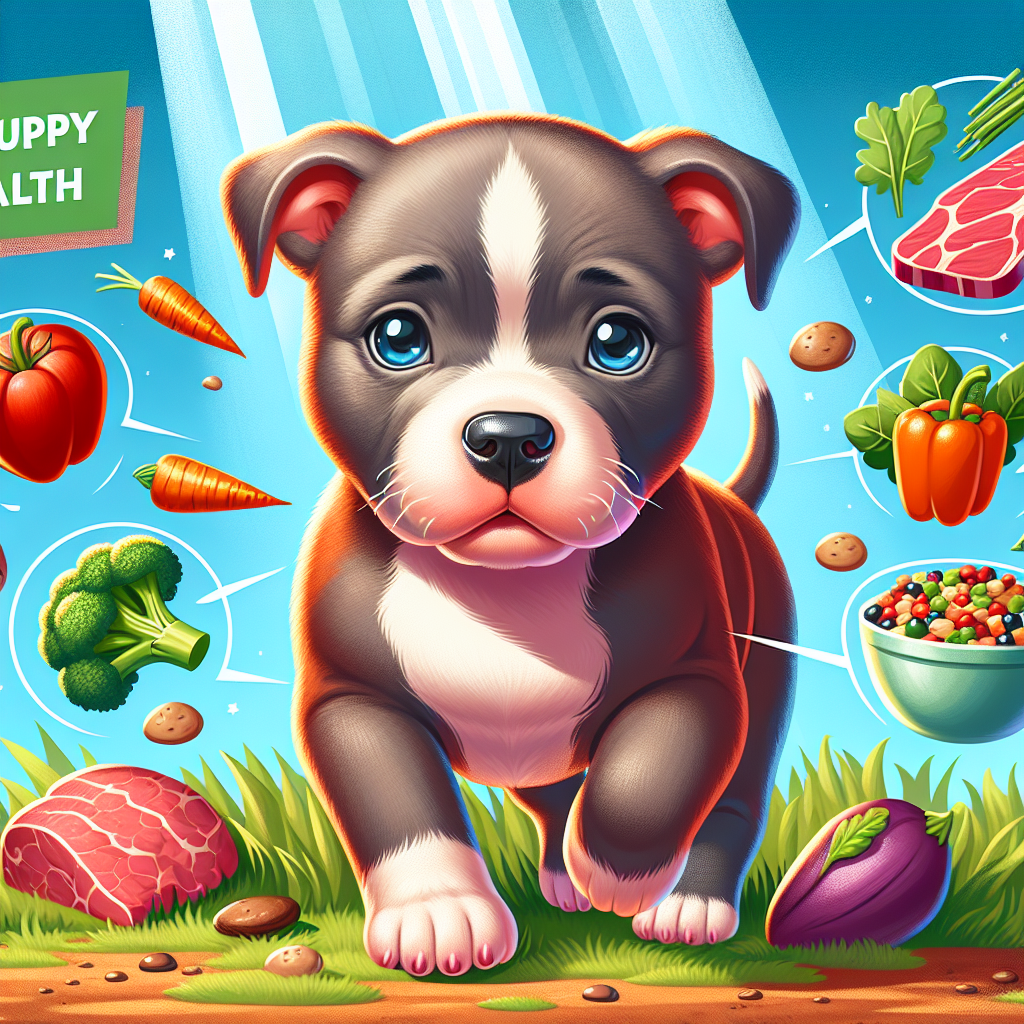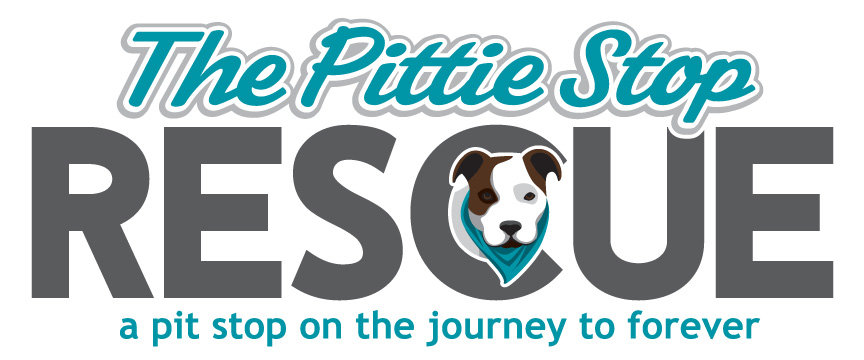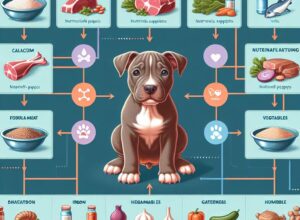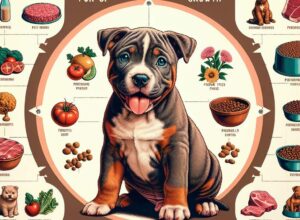
Nourishing Your Pitbull Puppy: A Guide to a Varied Diet
When it comes to raising a healthy pitbull puppy, what they eat is as important as the love and training you give them. A varied diet isn’t just about keeping mealtime exciting; it’s about ensuring your pitbull gets all the nutrients they need to grow strong and stay healthy. Let’s walk through the essentials of a balanced diet that will help your pitbull puppy thrive.
Key Takeways
-
A balanced diet for pitbull puppies should include a mix of proteins, fats, and carbohydrates.
-
Vitamins and minerals are crucial for your puppy’s development and overall health.
-
Meat should be the cornerstone of your pitbull’s diet, but it’s important to choose the right kind.
-
Introducing a variety of foods early on can help prevent allergies and pickiness.
-
Always transition to new foods gradually to avoid digestive issues.
Understanding Your Pitbull Puppy’s Dietary Needs
Every pitbull puppy is unique, but they all share a need for a diet that supports their rapid growth and active lifestyle. The right nutrition can help set the stage for a long, healthy life. So, what exactly does a good diet for a pitbull puppy look like? It’s all about balance and variety.
The Building Blocks: Proteins, Fats, and Carbohydrates
Proteins are the building blocks of your puppy’s body. They help build muscle, repair tissue, and keep the immune system strong. Look for high-quality sources like chicken, beef, and fish. Fats are a concentrated source of energy and help your puppy absorb certain vitamins. They also keep their coat shiny and skin healthy. Carbohydrates provide energy and help with digestion. Whole grains, like brown rice and oats, are great options.
Remember, the key is balance. Your pitbull puppy needs a mix of these nutrients in the right proportions. Too much of one thing can be just as bad as too little.
Vitamins and Minerals: The Micro-Nutrients Vital for Health
Vitamins and minerals might be needed in smaller amounts than proteins, fats, and carbs, but they’re just as important. They support everything from bone health to nerve function. A varied diet will help ensure your puppy gets all these essential nutrients. Foods like vegetables and fruits can be great natural sources, along with well-formulated puppy foods.
Always check with your vet before adding supplements to your puppy’s diet. Sometimes, the best intentions can lead to an overdose of certain vitamins, which can be harmful.
Selecting the Right Foods for Your Furry Friend
Choosing the right food for your pitbull puppy can feel overwhelming with all the options out there. But don’t worry, we’ve got your back. The goal is to find foods that not only meet the nutritional needs of your growing pup but also fit into a varied diet plan that will help them become accustomed to different flavors and textures.
Start with a high-quality puppy food that’s formulated for large breeds. This will ensure that your pitbull gets the right balance of nutrients tailored to their growth needs. From there, you can begin to add in fresh foods to provide variety.
When selecting foods, always read the labels. You want to see real meat listed as the first ingredient, not by-products or fillers. Whole foods are always better than processed ones. And if you’re ever in doubt, ask your vet for recommendations.
Meat and Animal Proteins: Foundation of a Strong Diet
Meat should be the cornerstone of your pitbull puppy’s diet. It’s packed with the protein they need to build strong muscles. When choosing meats, go for lean cuts and consider a variety of sources:
-
Chicken is a great starter protein that’s easy on the stomach.
-
Beef provides iron and other minerals that are vital for health.
-
Fish is rich in omega-3 fatty acids, which support brain development and a healthy coat.
-
Lamb and turkey are also good options, offering different flavors and nutrient profiles.
Remember, variety is key. Rotating through different protein sources can help prevent allergies and keep your puppy interested in their food. Plus, different meats offer different benefits, so a rotation ensures your pup gets a range of nutrients.
Fruits and Vegetables: Nature’s Nutritional Gifts
Fruits and veggies aren’t just healthy snacks for humans; they’re great for your pitbull puppy too! They’re full of vitamins, minerals, and fiber that help keep your pup’s digestive system running smoothly. Carrots, for instance, are great for their teeth, while blueberries are packed with antioxidants. But remember, not all fruits and vegetables are safe for dogs, so do your research before sharing your salad.
-
Pumpkin can help with digestion and is good for both diarrhea and constipation.
-
Apples (without the seeds) are a crunchy treat that can help clean teeth.
-
Green beans are low in calories and high in fiber, making them a healthy snack.
-
Spinach is rich in iron and antioxidants, though it should be given in moderation.
-
Sweet potatoes are a great source of vitamin A and beta-carotene.
Introducing these foods slowly will allow you to monitor for any adverse reactions and ensure your puppy enjoys a wide range of nutrients.
Healthy Fats and Oils: Sustaining Energy and Coat Health
Healthy fats are a crucial part of your pitbull puppy’s diet. They provide energy, help absorb vitamins, and promote a shiny, healthy coat. Sources of good fats include fish oil, which is high in omega-3 fatty acids, and flaxseed oil, which is rich in omega-6 fatty acids. A little bit goes a long way, so be careful not to overdo it—too much fat can lead to weight gain and other health issues.
When incorporating fats into your puppy’s diet, consider these options:
-
Adding a teaspoon of coconut oil to their food can improve skin health.
-
Salmon oil supplements are great for supporting cognitive function and joint health.
-
Chicken fat, found in many puppy foods, is a good source of energy and flavor.
Always check with your vet before adding supplements or new fats to your puppy’s diet to ensure it’s the right choice for their specific needs.
Grains and Carbohydrates: Choosing the Best for Digestion and Energy
While some dog diets minimize grains, they can be an important source of energy for your pitbull puppy. Whole grains, like brown rice and barley, are packed with fiber, which helps with digestion. They also provide essential vitamins and minerals. When selecting grain-inclusive foods, look for whole grain ingredients rather than processed grains or fillers.
-
Oats are a great source of soluble fiber, which can help regulate blood glucose levels.
-
Quinoa is a gluten-free option that’s high in protein and all nine essential amino acids.
-
Brown rice provides B vitamins and minerals, along with being a good energy source.
Keep an eye on your puppy’s response to grains. Some dogs may be sensitive or allergic, so it’s important to introduce any new grain slowly and in small amounts.
Transitioning to a Varied Diet: Doing It Safely
Switching up your pitbull puppy’s diet can provide them with a range of nutrients and flavors. However, sudden changes can upset their stomach. To transition safely, mix a little of the new food with their current food, gradually increasing the new food over the course of a week or so. This gives their digestive system time to adjust.
Introducing New Foods Gradually
When you’re ready to introduce new foods, start with a small amount and watch for any signs of digestive upset, such as diarrhea or vomiting. If your puppy tolerates the new food well, you can slowly increase the amount. This gradual approach also helps you identify any food sensitivities or allergies your puppy may have.
Here’s a quick guide to introducing new foods:
-
Start with a mix of 75% old food and 25% new food for a couple of days.
-
Move to a 50/50 blend if there are no signs of digestive distress.
-
Transition to a 25% old food and 75% new food mix after a few more days.
-
Finally, switch to 100% new food if your puppy is still doing well.
Noticing and Responding to Food Sensitivities
Just like people, puppies can have food sensitivities. Signs may include itching, red skin, ear infections, or gastrointestinal problems. If you notice any of these symptoms, it’s important to pinpoint the cause. Sometimes, it may be a specific protein or grain causing the issue. An elimination diet, conducted under the guidance of your vet, can help identify the culprit.
Remember, patience is key when dealing with food sensitivities. It can take time to figure out what’s bothering your pup, but once you do, you’ll be able to tailor their diet for better health.
Balancing Quantity with Activity: A Delicate Dance
Finding the right amount of food for your pitbull puppy can be tricky. They’re growing and active, which means they need enough calories to support their energy needs. But at the same time, overfeeding can lead to obesity, which comes with its own set of health problems. It’s all about finding that perfect balance.
As a general rule, puppies need more calories than adult dogs. The exact amount will depend on their age, weight, and activity level. Your vet can help you determine the right daily calorie intake for your pup. Then, it’s up to you to make sure they’re getting the right amount of exercise to burn off those calories. Regular playtime and walks are essential for their physical and mental health.
Assessing Your Puppy’s Activity Level
Every pitbull puppy is a bundle of energy, but their activity levels can vary. To tailor their diet correctly, you need to gauge how much exercise they’re getting. Puppies that love to run, play, and explore will need more calories than those who prefer a leisurely pace. Keep an eye on their play habits and adjust their food intake accordingly. If you’re unsure, a chat with your vet can provide guidance on what’s best for your pup’s activity level.
Customizing Portion Sizes: Not Too Little, Not Too Much
It’s crucial to get portion sizes right. Too much food can lead to weight gain, while too little can hinder growth and development. Most dog food packages have a feeding guide based on weight and age, which is a good starting point. However, these are just guidelines. You know your puppy best, so if they’re leaving food behind or still seem hungry, you may need to adjust the portions. Remember, a lean, healthy puppy is a happy puppy!
Common Pitfalls: What to Avoid in Their Diet
Even with the best intentions, it’s easy to make mistakes when it comes to your pitbull puppy’s diet. Being aware of common pitfalls can help you steer clear of them. The goal is to provide a balanced diet that supports your puppy’s growth without exposing them to potential harm.
Foods That May Cause Harm to Pitbull Puppies
Some foods that are safe for humans can be dangerous for dogs. It’s important to know which ones to avoid:
-
Chocolate, coffee, and caffeine contain substances that can be toxic to dogs.
-
Grapes and raisins can cause kidney failure in dogs.
-
Onions, garlic, and chives can cause gastrointestinal irritation and red blood cell damage.
-
Xylitol, an artificial sweetener found in many products, can lead to liver failure and hypoglycemia.
-
Alcohol, even in small amounts, can be poisonous to dogs.
Always keep these foods out of your puppy’s reach and be mindful of what they might find on the ground during walks or in the park.
How Overfeeding Can Affect Puppy Development
Overfeeding your pitbull puppy can lead to obesity, which is a growing concern in pets. Excess weight can put strain on developing bones and joints, potentially leading to issues like hip dysplasia. It can also increase the risk of diabetes and heart disease. Monitoring your puppy’s body condition and adjusting their food intake as they grow is key to preventing these problems.
Maintaining Long-Term Health: The Benefits of Dietary Variety
A varied diet isn’t just about keeping your pitbull puppy interested in their meals. It’s about laying the foundation for good health throughout their life. By providing a range of different foods, you’re exposing them to a wider array of nutrients, which can bolster their immune system and overall well-being.
Promoting a Robust Immune System Through Diet
The right mix of nutrients can help your pitbull puppy’s immune system develop strong defenses against illness. Antioxidants found in fruits and vegetables, for example, can protect their cells from damage. Omega-3 fatty acids from fish oil can reduce inflammation. A varied diet rich in these nutrients can help your puppy fight off infections and stay healthy.
Remember, a strong immune system starts with a balanced diet. Make sure your pitbull puppy gets all the vitamins and minerals they need by incorporating a variety of whole foods into their meals. This way, you’re not just feeding them; you’re nurturing their ability to thrive.
Preventing Allergies and Food Intolerance
One of the biggest benefits of a varied diet is the role it plays in preventing allergies and food intolerances. Just like us, when puppies eat the same thing day in and day out, they’re more likely to develop sensitivities to those foods. By rotating through different proteins, grains, and veggies, you’re reducing the risk of your pitbull puppy developing an allergy or intolerance to any one ingredient.
-
Introduce new foods one at a time to monitor for reactions.
-
Keep a food diary to track what your puppy eats and their reactions to each food.
-
Consult with your vet if you notice symptoms like itching, redness, or digestive upset.
-
Choose hypoallergenic foods if your puppy shows signs of food sensitivities.
-
Consider a limited ingredient diet to simplify identifying potential allergens.
Remember, early exposure to a variety of foods can help your puppy’s immune system learn to tolerate different ingredients, which is a win for their long-term health.
Supporting Your Pitbull Puppy’s Growth
Your pitbull puppy’s growth is a top priority, and diet plays a critical role. A well-rounded diet ensures they get all the nutrients necessary for healthy development. This means not just focusing on the present, but planning for their future health as well.
Proper growth is about more than just getting bigger; it’s about developing a strong foundation for a lifetime of health and happiness. That’s why it’s so important to provide a diet that supports their development in every way.
The Role of Diet in Hip and Joint Health
For pitbull puppies, who are prone to hip and joint issues like hip dysplasia, the right diet can make all the difference. Nutrients like omega-3 fatty acids, glucosamine, and chondroitin support joint health and can help prevent these conditions from developing or worsening.
-
Include foods rich in omega-3s, like fish oil, to reduce joint inflammation.
-
Look for puppy foods that include joint-supporting supplements like glucosamine.
-
Keep your puppy at a healthy weight to avoid extra stress on their joints.
-
Ensure they get regular, gentle exercise to strengthen the muscles around the joints.
By paying attention to these dietary details, you’re helping your puppy build strong, healthy joints that will support them as they grow into adulthood.
Significance of Nutrients in Heart and Organ Development
Every bite your pitbull puppy takes can contribute to their heart and organ health. Nutrients like taurine, L-carnitine, and antioxidants are especially important for developing a strong heart and healthy organs.
-
Taurine is an amino acid that’s vital for heart health, and it’s found in animal-based proteins.
-
L-carnitine helps with energy production and can be beneficial for heart function.
-
Antioxidants from fruits and vegetables protect organs from oxidative stress.
Ensuring these nutrients are part of your puppy’s diet supports their overall growth and leads to a healthier, more vibrant adult dog.
Frequently Asked Questions (FAQ)
How Often Should I Change My Pitbull Puppy’s Diet?
It’s best to change your pitbull puppy’s diet gradually and not too frequently. A good rule of thumb is to introduce a new protein source or brand of food every three to four months. This allows time for their digestive system to adjust and for you to monitor for any adverse reactions.
Always transition to a new food over a period of at least a week, mixing it with the old food to prevent stomach upset.
Can a Varied Diet Prevent Common Pitbull Health Issues?
A varied diet can help prevent some of the common health issues in pitbulls, such as obesity, allergies, and certain deficiencies. By providing a range of nutrients, you’re less likely to miss out on any one essential vitamin or mineral. Plus, a diet that includes different foods can help maintain a healthy weight and reduce the risk of allergies.
However, it’s important to note that diet isn’t a cure-all. Genetics and other factors also play a role in your puppy’s health. Always work closely with your vet to address any health concerns and to tailor your puppy’s diet to their specific needs.
Which Foods Are Absolutely Off-Limits for Pitbull Puppies?
As a loving pitbull puppy parent, it’s crucial to know which foods can be harmful to your furry friend. Certain foods that we humans enjoy can be dangerous for your pup and should be avoided at all costs. Here’s a list of no-go items:
-
Chocolate, caffeine, and coffee: These contain methylxanthines, which can cause vomiting, diarrhea, panting, excessive thirst and urination, hyperactivity, abnormal heart rhythm, tremors, seizures, and even death.
-
Alcohol: Even small amounts of alcohol, whether in drinks, syrups, or raw dough, can cause vomiting, diarrhea, central nervous system depression, problems with coordination, difficulty breathing, coma, or even death.
-
Grapes and raisins: These fruits can cause kidney failure in dogs, and it’s best to keep them out of reach entirely.
-
Onions, garlic, and chives: These can cause gastrointestinal irritation and could lead to red blood cell damage.
-
Xylitol: This sweetener found in many sugar-free products can lead to insulin release in many animals, which can cause liver failure.
Prevention is key, so always be vigilant about what your puppy has access to. If you suspect your pitbull puppy has ingested any of these dangerous foods, contact your veterinarian immediately.
How Do I Know If My Puppy Has a Food Allergy?
Food allergies in puppies can be tricky to diagnose, as symptoms can be similar to other conditions. Here are some signs that may indicate your pitbull puppy has a food allergy:
-
Chronic ear inflammation
-
Gastrointestinal problems like diarrhea and vomiting
-
Chronic gas
-
Licking their paws excessively
-
Itchy rear end
-
Chronic skin infections
If you notice any of these symptoms, it’s important to consult with your vet. They may recommend an elimination diet, which involves removing certain foods from your puppy’s diet and then gradually reintroducing them to pinpoint the allergen.
Are Supplements Necessary for a Pitbull Puppy’s Diet?
While a varied and balanced diet is usually enough to meet all of your pitbull puppy’s nutritional needs, there are situations where supplements can be beneficial. However, it’s essential to proceed with caution and under the guidance of a veterinarian. Over-supplementation can be just as harmful as a deficiency.
Supplements may be necessary if:
-
Your puppy has a specific vitamin or mineral deficiency.
-
They have a condition that requires additional support, such as joint issues.
-
Your vet recommends them as part of a treatment plan.
Always choose high-quality supplements that are formulated for dogs, and avoid giving human vitamins to your puppy. The right supplement can be beneficial, but the wrong one can cause harm.
In conclusion, raising a healthy pitbull puppy is a rewarding journey that requires attention to their dietary needs. A varied diet not only provides the essential nutrients for growth and development but also introduces your puppy to a world of flavors, which can prevent future health issues. Always be mindful of the foods that are toxic to dogs, watch for signs of food allergies, and consult your vet before adding any supplements to your puppy’s diet. By following these guidelines, you’ll ensure that your pitbull puppy grows up to be a strong, happy, and healthy companion for years to come.
Can I give my pitbull puppy human food as treats?
While some human foods are safe in moderation, it’s important to stick to those known to be safe for dogs. Avoid toxic foods and those high in fat, salt, or sugar. When in doubt, opt for treats made specifically for dogs.
How much food should I feed my pitbull puppy?
The amount of food your pitbull puppy needs depends on their age, size, and activity level. Refer to the feeding guide on your puppy food’s packaging and consult with your vet to ensure you’re providing the right amount.
What should I do if my puppy is a picky eater?
For picky eaters, try mixing in a little wet food with their kibble, or add a topper like cooked, unseasoned chicken. Ensure the food is fresh and at room temperature. If pickiness persists, consult your vet to rule out any underlying health issues.
How often should my pitbull puppy eat?
Puppies generally eat three to four times a day. As they grow, you can gradually reduce feeding to twice daily. Consistent meal times help establish a routine and aid in house training.
Is grain-free food better for my pitbull puppy?
Grain-free diets are popular, but they’re not necessarily better. Some puppies may require grain-free for specific health reasons, but many do well with grains. Consult your vet to determine the best diet for your puppy.
What are the signs of a good quality puppy food?
Good quality puppy food will list a high-quality protein source as the first ingredient, contain a balance of nutrients suitable for puppies, and be free from unnecessary fillers or artificial additives.
How can I ensure my pitbull puppy maintains a healthy weight?
Monitor their body condition, provide regular exercise, and avoid overfeeding. Adjust their food intake based on their activity level and consult your vet for personalized advice.



